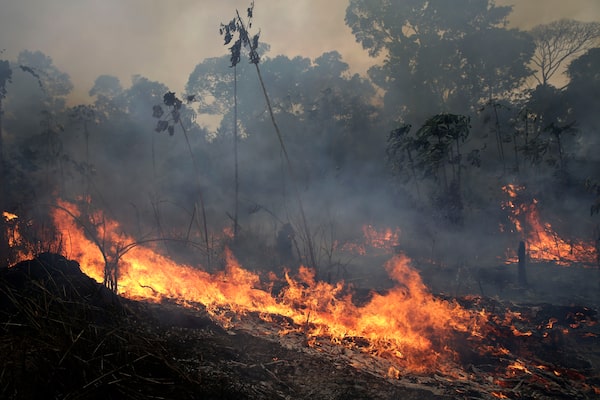
A fire burns along the road to Jacunda National Forest, near the city of Porto Velho in the Vila Nova Samuel region which is part of Brazil's Amazon, Aug. 26, 2019.Eraldo Peres/The Associated Press
Canada became a driving force behind one of the few concrete measures unveiled at the Group of Seven summit by announcing it would deliver financial and technical support to Brazil to help it fight the fires that are devastating the Amazon.
At the close of the summit in Biarritz, France, on Monday, Prime Minister Justin Trudeau said Canada would make $15-million, plus water bombers, immediately available.
“One of the things we have seen over the past years, as Canada has faced increasingly extreme wildfire events, is there is a global network of support and friends who lean on each other,” he told reporters. “We will be there to support our friends in South America as we fight a blaze that has impacts not just on their region but on our entire planet.”
The Prime Minister’s office could not clarify whether Canada’s financial contribution is on top of a US$20-million Brazilian aid package that was announced earlier Monday by French President Emmanuel Macron, the host of the summit, and Chilean President Sebastian Pinera. Without being specific, Mr. Macron said the amount was from the G7 countries. The PMO referred queries to the French government.
The total aid package to Brazil may end up being substantially bigger than the US$20-million unveiled by Mr. Macron, diplomats at the summit said. Britain was said to be contributing £11-million ($17.8-million); the United States was said to be contributing US$20-million. The American contribution comes as a surprise, given Mr. Trump’s disdain for environmental issues. He did not attend Monday’s G7 session on climate change, biodiversity and oceans, although “his team was there," Mr. Macron said.
It is not known how many water bombers will be sent to Brazil. The Canadian government has a water-bomber pooling system with the provinces and the territories, and some fire-fighting aircraft are privately owned and could be rented.
It is also unclear whether Brazilian President Jair Bolsonaro is willing to accept G7 aid, including from Canada. Meanwhile, environmental groups warned that the G7 had not gone far enough.
“While we are encouraged to see leaders reacting to unprecedented forest fires in the Amazon, they must recognize that much more is needed on the Amazonia tragedy and that this is just the tip of the iceberg,” said Manuel Pulgar-Vidal, head of WWF’s global climate and energy group.
Opinion: Brazil’s President is committing ecocide. We must stop him
Mr. Trudeau, Mr. Trump and the other leaders were upbeat about the outcome of the G7 summit, even though it appeared that Mr. Trump and the other leaders were still at odds on many issues, including tariffs and whether Russia should be admitted back into the group (the G8 became the G7 in 2014, when Russia was expelled because of its seizure of Crimea).
The G7 issued a simple, one-page “declaration” – there was no official communiqué – underlying “great unity and the positive spirit of the debates” on issues including trade, Iran, Libya and Hong Kong. The sections were short, largely free of detail and unsurprising.
Iran and the possible renegotiation of the nuclear deal was the one issue where the some progress, even a breakthrough, seems possible. Mr. Macron said “nothing is certain, but conditions are such that a meeting between [Iranian] President Hassan Rouhani and President Donald Trump could take place – and so that an agreement could be reached.”
Mr. Trump was non-committal but used a news conference to say that “if the circumstances were correct, I would certainly agree” to a meeting with Mr. Rouhani.
He added, “We are not looking for leadership change … We’re looking for no nuclear weapons, no ballistic missiles and a longer period of time” than the current nuclear agreement, whose curbs started to expire in 2016. The United States has pulled out of the Iranian nuclear-abatement deal, although Europe continues to support it.
Opinion: Trump was polite, but found little common ground with other G7 leaders
Mr. Trudeau said he supports Mr. Macron’s Iran initiative even if Canada will have no direct role in any new negotiations (Canada has no diplomatic relations with Tehran and has a range of sanctions on Iran). “We continue to be part of the global community that is calling concretely for a reduction of tensions in the region. We support [the nuclear deal with Iran] and its important goal of continuing to keep Iran from developing nuclear weapons.”
Mr. Trudeau said he made it clear at the summit that he “does not support Russia’s reintegration into the G7” because of “Russia’s aggression and the illegal annexation of Crimea.”
He hinted strongly, however, that he would not boycott the 2020 G7 summit, which will be held in the United States, if Mr. Trump invites Russia back into the global club. “I have never shied away from global summits, from tables around which Mr. Putin sat,” he said. “Given an opportunity, I will repeat myself and listen to what he has to say.”
Mr. Trudeau said Canada will continue to work on a trade deal that would kick in after Britain leaves the European Union, which is scheduled to happen by the end of October. He would not say whether Canada would be the first country to implement a trade deal with post-Brexit Britain, although considerable amounts of work have been done on the file.
“Certainly Canada has deep ties of friendship and trade with the U.K. and we would certainly hope to see that continue as smoothly as possible,” he said. “Our officials will be getting together to continue to discuss how we can ensure there is minimal disruption for Canadian businesses.”
Our Morning Update and Evening Update newsletters are written by Globe editors, giving you a concise summary of the day’s most important headlines. Sign up today.
 Eric Reguly
Eric Reguly